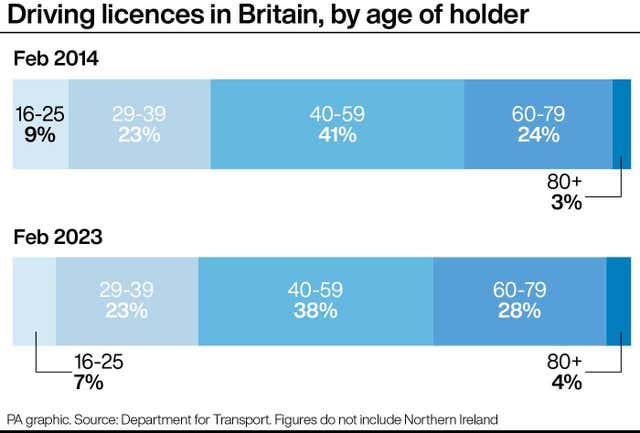Call for regular eye tests for drivers as 4% of licence holders are 80 or older
A record one in 25 driving licence holders in Britain is aged 80 or above, leading to renewed calls for regular eye tests for motorists.
Some 1.6 million people with a licence are in that age category, according to PA news agency analysis of Driver and Vehicle Licensing Agency (DVLA) figures.
That is up from 1.4 million two years ago and accounts for 4% of all drivers with a full licence, the most in records dating back to 2012.

Responding to the increase, motoring research charity the RAC Foundation urged the Government to introduce “compulsory eye tests for all drivers” during licence renewals.
A recent YouGov survey indicated that 65% of British adults would support drivers aged 70 or above having to retake a practical test every three years to keep their licence.
Drivers are not subjected to mandatory tests or health checks after obtaining their licence no matter how old they become, although they are required to inform the DVLA if they are no longer fit to drive.
Department for Transport (DfT) figures show older drivers involved in serious crashes are more likely to have failed to look properly than younger motorists.
The error contributed to 30% of incidents in which at least one person was killed or seriously injured on Britain’s roads between 2016 and 2021 involving drivers aged over 70.
That is compared with 22% for younger drivers.
RAC Foundation director Steve Gooding said he does not support people being required to take another full driving test when they reach a certain age.
But he believes there is a “strong case” for introducing a fitness to drive assessment for older motorists which focuses on “the visual, mental and physical skills needed to carry on driving safely”.
He added: “We do back compulsory eye tests for all drivers when they renew their photocard licences.”
Licences must be renewed every three years once the holder reaches 70, compared with every 10 years up to that point.
The process does not involve any tests.
Mr Gooding said older drivers tend to “know their limitations” and are good at “self-regulating” when they take to the road, such as avoiding driving at night or during the busiest times of day.
He went on: “Many families can and do play their part by having that difficult discussion with an elderly loved one who might need to vacate the driver’s seat.
“Hanging up the keys is a huge decision for anyone who relies on the independence driving brings but it is something that will face all of us lucky to live to a ripe old age.”
Earlier this month, a coroner called for mandatory checks on older drivers to be considered after a woman using a pedestrian crossing was struck and killed by a car driven by a 95-year-old man who had passed a red light.
Kathleen Fancourt, 89, was using a mobility scooter when the incident happened in Chichester, West Sussex, in September 2021.
West Sussex senior coroner Penelope Schofield sent a report to Transport Secretary Mark Harper and DVLA chief executive Julie Lennard which stated: “In my opinion there is a risk that future deaths could occur unless action is taken… at present there is no upper legal limit for drivers.”
She added: “There is a concern that if no checks are carried out a driver may be oblivious to their enduring medical condition.”
Drivers aged 70 or above were behind the wheel of cars involved in 2,410 crashes on Britain’s roads in 2021 in which at least one person was killed or seriously injured.
That represents 10% of all such crashes where drivers’ ages is known.
Drivers aged 70 or above make up 14% of all licence holders.

 Yahoo News
Yahoo News 
